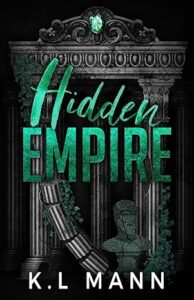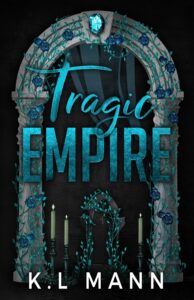Acold gust of wind hits my face as I stand before the floor-to-ceiling windows of my room, overlooking the endless expanse of the dark blue ocean.
In the distance, boats dot the horizon, their lights flickering like lost souls drifting between this world and the next.
The water is so black it swallows the stars whole, refusing to reflect even the crescent moon hanging lazily in the sky overhead.
A long sigh leaves my lips.
From here, the city looks almost dreamy, curling around the ocean like vines of light.
But I know better.
Nuova Speranza wasn’t built on dreams, but on blood.
It rose from the backs of the desperate and the ambitious, men who saw opportunity in the cracks of civilization and pried them open with bare hands and bloodied knuckles.
It grew from smuggled cargo off the hulls of illegal freighters, from backroom deals sealed with scotch and gunpowder, from whispered names that would be dead by morning.
It was carved from handshakes that meant war, from alliances made over candlelit dinners where enemies smiled over their wine and decided which family would fall next.
And when the dust settled, when the streets were slick with the blood of men who reached too far, only one truth remained:
Power belongs to those willing to take it.
Beyond the bay, the city stretches wide in a dense grid of buildings and streets lit by steady rows of streetlights.
Boats move along the waterfront with their shapes outlined against the dark water.
Cranes tower over the docks, shifting containers under bright floodlights.
Restaurants along the shoreline glow with soft interior light, casting long reflections onto the wet pavement.
Traffic pushes along the main roads with headlights cutting through the night.
Signs glow in red and blue above storefronts with their colors spreading across the sidewalks.
Smoke drifts from food stalls, curling around people moving through narrow streets.
In the distance, the skyline rises, sharp and unmoving against the sky.
The districts are divided in invisible ink—each block, each business, each corner of this city belonging to someone.
Some streets are owned by old Sicilian bloodlines, their power inherited, respected.
Others are run by the Irish, the Russians, the Dominicans—groups that rose and fell like tides, shifting with every decade, every war.
But the real power?
It sits in the smoke-filled rooms of men who don’t flinch at the sound of a gunshot in the night.
It lies in the ink of contracts that dictate the price of blood, in the unmarked bills exchanged between outstretched hands, in the shipments that arrive under the cover of darkness, carrying goods worth more than human lives.
It’s in the docks, where shipments flow in from every corner of the world: heroin packed into crates of imported cigars, diamonds nestled between bolts of silk, weapons hidden in false-bottomed cargo holds.
The longshoremen work with their heads down, pockets full of hush money, knowing better than to ask questions.
It’s in the warehouses, where counterfeit pharmaceuticals are boxed up alongside stolen art and luxury cars stripped of their original identities.
Where bodies are sometimes stacked like inventory, waiting to be disposed of before the sun rises.
It’s in the underground casinos, where money changes hands faster than the turn of a card, where fortunes are made and lost in a single night, and where debt is a chain no man can break—except in death.
And it’s in the streets, where businesses pay their dues in quiet desperation, stuffing envelopes of cash into the hands of men who offer protection in return for obedience.
The ones who refuse?
They learn that fire consumes more than just buildings.
The lifeblood of Nuova Speranza runs thick with greed, with ambition, with the desperate need to survive.
And at the heart of it all is the Salvatore family.
But they didn’t start out as kings of this city.
We were here first.
Decades ago, before the streets of Nuova Speranza pulsed with the influence of the Salvatores, my family had already laid the foundations of an empire that should have lasted for generations.
My great-grandfather, Giorgio Lombardi, was one of the first men to understand that real power isn’t just taken but built.
And he built it well.
Back in the Prohibition Era, when men with ambition saw opportunity in the weaknesses of law, Giorgio was one of the few with the vision to weaponize vice itself.
While small-time crooks were still running back-alley bootlegging operations, Giorgio took control of the ports, ensuring that every barrel of whiskey, every crate of smuggled champagne from Canada, flowed through his network.
The docks became his kingdom, the unions his army.
But he knew better than to rule with brute force alone.
He cultivated politicians like he cultivated vineyards, grooming them, feeding them, ensuring their thirst for power could only be quenched with Lombardi wine.
By the time Prohibition ended, he had already shifted his operations into gambling, construction, and high-end textile imports that laundered millions with a single shipment.
Under his reign, the Lombardi family was untouchable.
For decades, no one in Nuova Speranza moved a single dollar without our family getting their cut.
When the Salvatores first arrived, they were nothing more than an afterthought, a family without old money, without legacy, without the deep-seated roots we had spent generations cultivating.
They were outsiders, war-born men whose lineage was written in blood rather than ink, and in the beginning, my grandpapa barely spared them a glance.
He believed in history, in the power of reputation, in the kind of loyalty that was inherited rather than bought.
But the Salvatores were not there to play by the rules of the old world.
They understood something my family, in our arrogance, had overlooked: that power is never given. It is only ever taken.
They did not challenge us openly.
There was no declaration of war, no single act of defiance that signaled their arrival as a real threat.
Instead, they planted their seeds quietly, moving through the cracks we had left in our wake, turning the men we had ignored into weapons aimed at our own foundation.
My family saw the workers as a means to an end, as nameless hands unloading shipments, faceless bodies standing watch over warehouses, necessary but replaceable.
We paid them just enough to keep them loyal, just little enough to ensure they would never rise beyond their station.
If they wanted more, they knew better than to ask.
The Salvatores, however, saw an opportunity.
At first, it was nothing more than whispered rumors in the bars near the docks, the kind of talk that most men dismissed as the drunken ramblings of those with little power and too many dreams.
‘You hear about the Salvatores?’
‘They’re paying men under the table, real money—not just scraps.’
‘Word is they’ve got a doctor who fixes broken ribs, busted hands, doesn’t ask questions.’
‘They take care of their own.’
It started small, insignificant enough that my grandpapa didn’t see it for what it was.
The Salvatores began by offering better wages to the men who worked the hardest, the ones who had given their lives to the docks only to be discarded when they were no longer useful.
They paid the medical bills of injured workers, ensuring that no man was left unable to provide for his family.
When a longshoreman was crippled by an accident that should have left his family destitute, the Salvatores sent his wife an envelope thick with cash and his sons a promise that they would always have work, no matter what.
And when the time came for the next union vote, men who had spent their entire lives fearing my family suddenly had a choice.
For the first time, they had an alternative to the Lombardis, one that did not demand their loyalty in exchange for fear, but rather, through something far more powerful.
Security.
Stability.
A future.
It should have been a warning. Instead, my grandpapa responded the only way a man like him could—with force.
Lombardi enforcers were sent to remind the workers where their loyalty belonged.
Men were beaten, threats were issued, families were warned that there would be consequences for forgetting their place.
Papa, Vittorio, was among those who orchestrated the retaliations, ensuring that the Salvatores’ slow-growing influence was cut out at the root before it could take hold.
But he underestimated them.
For every man we threatened, the Salvatores protected three.
For every worker we tried to bring back in line, four more turned against us.
Not because they were afraid.
But because, for the first time, they were given a reason not to be.
Loyalty bought with money is weak.
Loyalty built on trust is unbreakable.
By the time my grandpapa realized the docks were slipping from his grasp, it was already too late.
The union had been turned against us, the men who had once relied on our family now calling another name when they needed help.
And when the Lombardis fought to regain control, the Salvatores did what needed to be done.
They did not rule solely through kindness, after all.
When Emilio Marchesi, my grandfather’s most trusted dock foreman, refused to turn, he vanished.
Two weeks later, his body washed up in the bay, his hands bound, his mouth stuffed with old union ballots.
The message was clear: ‘We are the future. You are the past.’
Some men who were unwilling to bow at first were given choices.
Their families were relocated, given new homes, their children’s tuition paid in full, their wives left with more money than they had ever seen.
It was not violence that turned them, but the realization that the Salvatores could give them a better life than we ever had.
By the end of the year, the docks belonged to them.
It was the first time in Nuova Speranza’s history that a family had risen to power not just through fear, but through something stronger: through choice.
And once they had the docks, everything else followed.
Papa never forgave them, even though an uneasy but necessary truce followed.
He had spent his entire life watching my grandpapa build an empire, only to see the Salvatores dismantle it, piece by piece, man by man, until there was nothing left but the illusion of power.
The Lombardis had wealth, influence, history, but unfortunately none of that mattered when men no longer believed in their rule.
Because power is not about money, or even how many politicians you own or how many businesses bear your name.
It is about who people turn to when they are afraid.
And they no longer turned to us.
For Papa, it was a betrayal he could never forget.
‘Signorina, hold still.’
I barely register my maid’s soft voice as she laces the back of my gown.
The fabric is delicate, handcrafted in Milan, but I feel like I’m being trussed up for slaughter.
I’ve always been a pawn in Papa’s empire, raised not as a daughter, but as an asset.
The perfect Lombardi woman—poised, educated, untouched by the filth of our business yet steeped in it just enough to understand my place.
They’ve sheltered me my entire life, kept me hidden behind security details and high walls, all so I could be used when the time was right.
And tonight, it seems, the time has come.
‘Aria.’
I glance up as my mother steps into the room, tall and elegant in her emerald silk gown.
She is the perfect picture of refinement, the kind of woman men fear because they cannot read her.
She inspects me the way she always does, as if I am an offering for the altar of power.
‘You look beautiful, cara mia,’ my mother murmurs, her voice gentle in a way that almost feels real.
The words wrap around me in how warm they sound, because warmth from her is what I have craved for so long that my throat tightens against the threat of tears.
I want to hold onto them, to believe that for once, she is speaking to me and not just to the image she needs me to project.
I want to think that maybe, just maybe, she is proud of me, not because I am useful, not because I serve a purpose, but simply because I am hers.
That foolish hope lasts all of three seconds.
Then, with all the carelessness of a man stepping on an ant with his boot, she snuffs it out. ‘Your training will serve the family well.’
My breath leaves me in a quiet exhale.
Of course. It was never about me.
It never is.
Mother does not give compliments freely.
She does not waste affection where it does not serve a purpose.
When she praises me, it is not love, it is calculation.
I swallow the bitter taste rising in my throat, offering a tight smile that barely stretches my lips.
‘I suppose that depends on what I’m being prepared for.’
She tilts her head, eyes flicking over me with the kind of assessment one gives a painting they did not create but must display regardless.
There is a beauty to her, something commanding and elegant, but she has worn this expression for so long—half amusement, half cold detachment—that I don’t think she remembers how to look any other way.
‘You’ll find out soon enough.’
The words should not unsettle me as much as they do.
They are spoken lightly, as if they hold no weight, but the knowing gleam in her eyes says otherwise.
I force my spine straighter, willing the unease pressing at my ribs to quiet as I stand and follow my mother out of my room.
The Lombardi estate stands as a monument to a time when our family’s power was absolute, when no one dared to question our dominion over Nuova Speranza.
Every inch of its architecture speaks to a legacy carved from ambition and ruthlessness, a testament to men who understood that wealth alone is not enough.
Power must be displayed, woven into the very walls so that those who step inside do not simply see it, but feel it.
The marble floors gleam under the golden glow of chandeliers, each stone quarried from Carrara and polished to perfection, their smooth surfaces whispering of extravagance and permanence.
The ceilings stretch high above, covered in hand-painted frescoes that depict not just scenes of gods and kings, but of conquest, of dominion, of stories that mirror our own.
Every brushstroke serves as a reminder that we are not just businessmen or criminals.
We are the architects of a dynasty that was never meant to fall.
Beyond the grand entrance, the courtyard unfurls like something lifted from the pages of history, lined with statues of our ancestors, their cold marble faces fixed in expressions of quiet authority.
These are the men who shaped our empire, who stood at the helm of Nuova Speranza long before the Salvatores ever dreamed of power.
They are not forgotten.
Their presence lingers, casting shadows over every deal made, every whispered conversation held within these walls.
The gardens, tended with meticulous care, are filled with imported olive trees and Sicilian roses, their perfume thick in the evening air.
Pathways wind through the estate, past fountains whose waters trickle in soft contrast to the weight of the conversations that unfold in the shaded alcoves.
Here, alliances are made and broken.
Here, enemies become business partners, and business partners become enemies.
At the farthest edge of the property, past the gardens and the courtyard, lies the vineyard, a piece of Italy transplanted into the heart of our city.
To outsiders, it is a symbol of culture and refinement, a nod to our heritage and our love of tradition.
To those who know better, it is something else entirely.
I take my place at the long mahogany table in the dining hall, my hands folded in my lap.
The evening tea is a mere formality.
This is not a family gathering but a war council in disguise.
Vittorio Lombardi sits at the head, the patriarch of a dynasty that is slipping through his fingers.
His silver hair is combed back, his suit impeccable, his rings flashing in the candlelight.
He is a man who wears charm like a weapon, whose smiles have always carried an undercurrent of menace.
Tonight, there is something in his demeanor that sets my nerves on edge.
‘I’ve made a decision,’ he announces, swirling his wine. The candlelight catches on his wedding band, the same one passed down from my grandpapa.
‘Things have been…unbalanced,’ he continues smoothly. ‘The Salvatores believe they own this city. That their grip on Nuova Speranza is unshakable. But power is never unshakable. It only waits for the right hands to tip the scales.’
A slow, approving murmur moves through the table.
Vittorio leans back in his chair and looks at me. ‘Which brings me to you, figlia mia.’
A cold weight settles in my chest.
‘You will do your part,’ he says simply, as if this has already been decided. ‘We will secure new alliances, new partnerships, and you will be at the center of it.’
Dread makes my stomach turn.
‘A marriage,’ he continues. ‘To an arms dealer with direct access to Eastern European manufacturers. Or perhaps an olive oil merchant with routes we can exploit. Someone with influence. Someone with power. Someone who will put the Lombardi name back on the map.’
I knew this was coming.
I have always known this was coming.
But knowing and hearing it aloud are two different things, and I understand perfectly well that this is no marriage.
Rather, it is a hand extended in alliance to someone who will never love me, someone chosen for the benefit of Papa’s empire, not for my own happiness.
And worst of all, I know who it won’t be.
Enzo Moretti.
The name causes a physical ache in my heart because it is a precious secret I’ve held for too long.
He is Luca Salvatore’s most feared hitman, the blade in the dark, the soldier who never hesitates when given an order.
His hands are stained with blood, and his loyalty to his family is absolute.
He would never betray the Salvatores, and I could never betray my own.
I school my face into an expression of acceptance.
I cannot fight this.
But inside, my blood burns with defiance.
Because I know the truth, deep in my bones.
No part of me wants Papa’s chosen groom.
I want the man I can never have.













